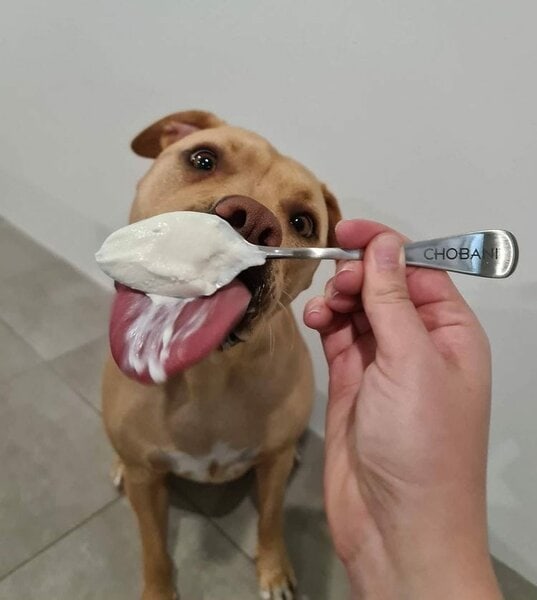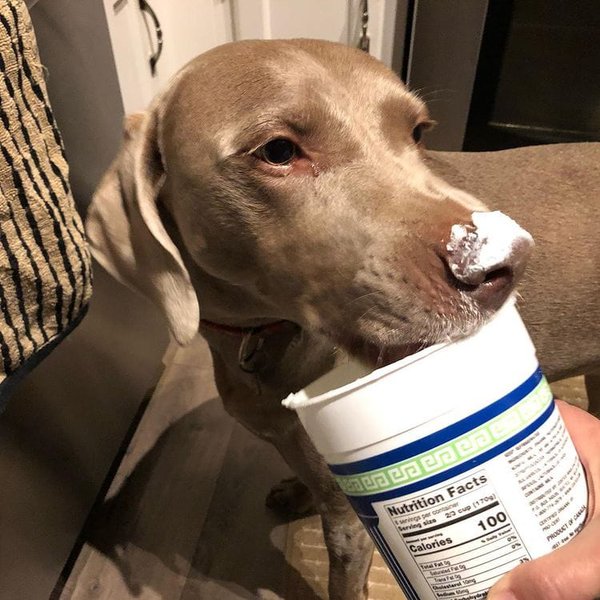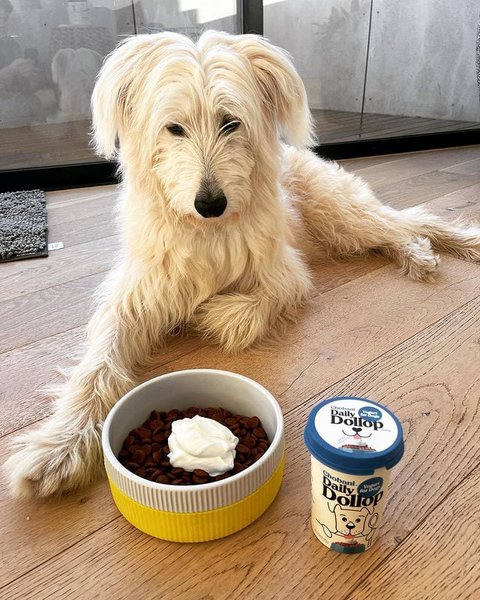Yogurt is a popular yummy snack for us humans, and as we help ourselves to this tasty goodness, it is only normal for our canine buddies to look at us with imploring eyes, hoping to get a taste.
But, can dogs eat plain yogurt? Dogs can indeed eat yogurt, and as a matter of fact, the best kind of yogurt to feed to your canine buddy is plain, unsweetened yogurt devoid of artificial additives. It is important to note that plain yogurt should never be fed to dogs in excess, and it is best served to a pooch as an occasional treat.
Plain yogurt contains minerals and nutrients that can be extremely helpful in maintaining a pooch’s health, and this is one of the reasons we advocate for the inclusion of this food substance in your Fido’s diet as an occasional treat.
However, as wonderful as plain yogurt can be for dogs, feeding pooches with this dairy product comes with its health risks, and these dangers are outlined in this article. However, before we go deeper into the health benefits and risks associated with feeding plain yogurt to dogs, let’s see why this food substance is generally safe for dogs to eat.
Can Dogs Eat Plain Yogurt?

Yes, dogs can eat plain yogurt in moderate amounts. And giving plain yogurt to a pooch as a treat offers a healthy alternative to feeding the dog with treats that have no nutritional value for dogs.
Plain yogurt or even non-fat plain yogurt is completely safe to feed to dogs, provided they don’t contain artificial sweeteners and preservatives that pose a threat to canine health.
Fruit-flavored yogurts should be avoided at all costs, as these tend to contain sugar or these artificial sweeteners that are toxic to dogs.
That said, if you’re feeding plain yogurt to a dog for the first time, it is important that you start by giving small amounts to the pooch while closely observing the dog for side effects that may indicate an allergy or an intolerance.
How Much Plain Yogurt Can My Dog Eat?
Now that we’ve established that plain yogurt is safe for dogs to eat, we also need to take a look at how much of this tasty treat a dog can consume without developing health issues.
As earlier stated, plain yogurt is best fed to dogs as an occasional treat rather than as the main part of the pooch’s meal; Hence, the vet-approved 10% rule should be applied when feeding plain yogurt to dogs.
Yogurt is considered human food and isn’t safe for dogs to consume in large quantities; Hence, plain yogurt shouldn’t make up more than 10% of a pooch’s total daily caloric intake.
The specific quantity that a pooch can safely consume in a day is largely dependent on the pooch’s size, age, and weight. But generally speaking, and as a rough estimate, adding one tablespoon of plain yogurt into your pooch’s diet is mostly sufficient to meet the 10% caloric requirement.
Also, to be doubly sure that you aren’t exceeding the caloric requirement when feeding your pooch with plain yogurt, it is advisable that you check the product label for the fat and caloric content before feeding it to your pooch.
What Are The Health Benefits Of Feeding Dogs With Plain Yogurt?

Some of the health benefits attached to feeding dogs with moderate amounts of plain yogurt include access to probiotics, which carry out several beneficial activities within a pooch’s body. Additionally, yogurt contains nutrients that play key roles in ensuring a pooch’s well-being.
Probiotic Benefits
Plain yogurt contains several beneficial microorganisms, widely referred to as probiotics, which carry out several important functions in a pooch’s body.
Probiotics contained in plain yogurt typically reside in a pooch’s digestive tract when consumed, and they:
- Aid digestion in dogs by breaking down food.
- Produce short-chain fatty acids, which help inhibit the activities and production of harmful bacteria, thereby strengthening a dog’s immune system.
- Help with the formation of nutrients and vitamins from food consumed by a pooch.
- Help improve canine diarrhea caused by a bacterial imbalance.
- Help prevent anxiety and reduce stress in dogs.
Nutritional Benefits
Apart from being rich in highly beneficial probiotics, plain yogurt also contains nutrients such as calcium, proteins, and potassium, all of which are important in maintaining a pooch’s overall well-being.
Calcium contained in plain yogurt is vital for the formation of strong bones and teeth in dogs, while protein contains essential amino acids that contribute to healthy hair, skin, and muscle development.
Potassium, on the other hand, assists with the transmission of electrical charges within a pooch’s heart, nerves, and muscles.
Can Plain Yogurt Be Bad For Dogs?
Feeding a dog with too much plain yogurt can result in digestion issues which typically develop into gastrointestinal problems and the development of fat-related health problems such as pancreatitis.
Gastrointestinal Upset
The canine body is not suitably equipped to handle and digest significant amounts of lactose after puppyhood; Hence, feeding a large amount of plain yogurt to your adult dog can result in the build-up of gas, vomiting, and diarrhea.
Additionally, some pooches are lactose intolerant, and feeding plain yogurt, which is largely composed of lactose, to such dogs can result in a serious gastrointestinal upset for the pooches in question.
Many healthy dogs can consume a spoon of plain yogurt without issues, though, and this treat is relatively easier for dogs to digest than plain milk.

High In Fat Content
Apart from issues with digestion, the overall high fat content typically contained in plain yogurt can pose a problem for dogs when consistently consumed in large quantities.
Excessive and continuous consumption of the fat contained in plain yogurt can not only result in stomach upsets but can also develop into serious health conditions such as pancreatitis.
Xylitol Poisoning
We’ve mentioned how plain yogurt is safe for dogs to eat in moderate amounts. But feeding a pooch with yogurt containing the littlest quantities of artificial sweeteners, such as xylitol, is nothing but a recipe for disaster.
Yogurts containing artificial sweeteners, such as xylitol, are extremely toxic for dogs to consume, and such products are usually responsible for inducing a drastic drop in the dog’s blood glucose level.
This drop in blood glucose level usually results in a dog exhibiting symptoms such as lethargy, seizures, loss of body coordination, and excessive urination, just to mention a few. If not promptly attended to, hypoglycemia can also result in a pooch’s death!
Consequently, and this can’t be emphasized enough, if you’re to feed your canine buddy with yogurt, it is important that you stick to feeding the pooch with plain, unsweetened yogurt.





